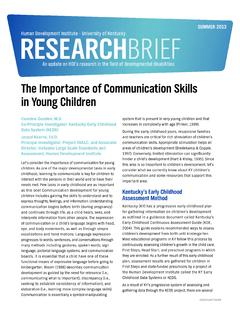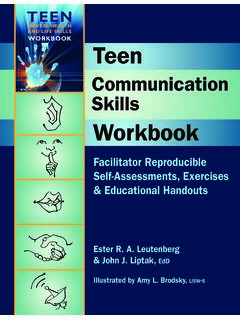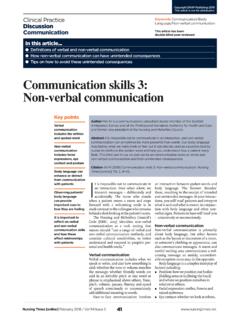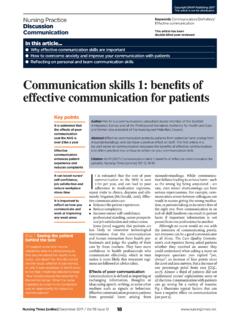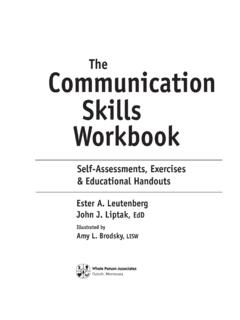Transcription of Lesson Effective Communication Skills
1 Realityworks 1 Lesson Effective Communication Skills Lesson Objectives After completing this Lesson , participants will be able to: Understand the definition of Communication Identify different types of Communication Successfully practice written, verbal and non-verbal Communication Skills Lesson at a Glance Activity Materials Preparation Approximate class time FOCUS Whiteboard and markers 1. None 15 20 minutes LEARN Using Clear Verbal Communication handout Images for Directors handout Drawing Space for Creators handout Business Letter Block Format handout Effective Written Communication on the Job - Business Letter Scenarios handout Business Letter Assessment Rubric Non-verbal Communication Brainstorming Activity handout 1. Print/photocopy the Using Clear Verbal Communication one per student 2. Print/photocopy the Images for Directors handout one copy with images cut apart 3.
2 Print/photocopy the Drawing Space for Creators one per group 4. Print/photocopy the Business Letter Block Format handout one per student 5. Print/photocopy the Effective Written Communication on the Job Business Letter Scenarios one per student Part 1 30 minutes Part 2 60 minutes Part 3 30 minutes Lesson Overview In this Lesson , participants will learn about various types of Communication and how important Effective Communication is in the workplace. Realityworks 2 6. Print/Photocopy the Business Letter Assessment Rubric one per student for the instructor assessment 7. Print/photocopy the Non-verbal Communication Brainstorming Activity handout one per group REVIEW None 1. None 10 minutes Realityworks 3 Lesson Effective Communication Skills FOCUS: Class Discussion 15 - 20 minutes Purpose: Good Communication Skills , both verbal and written, are important to have on the job.
3 This Lesson will give students a chance evaluate Effective Communication and how they can improve their own Communication Skills . Materials: White board and marker Facilitation Steps: 1. Begin by introducing the definition of Communication to the class. Communication is the exchange of information between a sender and a receiver. Communication involves speaking, listening, reading and writing. To be an Effective communicator you need to be clear and direct. Ask students what types of Communication occur. Some answers might be written, verbal or nonverbal. 2. Divide the class into small groups of three or four students. Assign a recorder to write down the group answers to the following question: How do you use Communication Skills at school? Give groups 5 minutes to brainstorm. 3. Call the class back together and have each recorder share their groups answers. Are there some that were on everyone s list? Some responses might be: Talking in class Writing a report Making a class presentation Answering a question 4.
4 Tell students that good Communication is a key skill that employers need in the workplace. Now that they have identified a few ways they are using and developing their Communication Skills in school, discuss ways they may use Communication Skills in the workplace. 5. Have each student choose one occupation (it can be anything) and give one example of how Communication is used in that position. (See below for examples) Doctor verbal Communication explaining treatment to a patient Journalist writing an news article for a magazine or newspaper Wait staff or server at a restaurant verbal Communication explaining daily specials to a customer Marketing associate writing a blog about a new product 6. Now that students have an understanding of what Communication is and how it is used on the job, ask each student to answer the following question: Why are good Communication Skills important in the workplace? (Hint: Think about what can happen when Communication is poor.)
5 7. Ask each student to share their answer to the question. Answers could include so that tasks are carried out accurately, so customers get the information they need, to get things done in an efficient manner. Realityworks 4 Lesson Effective Communication Skills LEARN: Active Practice 120 minutes Purpose: The purpose of this activity is to have participants actively practice Effective Communication in a series of different activities. To develop Effective Communication Skills , students need practice just like any other skill. Materials: Images for Directors handout Drawing Space for Creators handout Using Clear Verbal Communication handout - one for each group Facilitation Steps: Activity 1 Using Clear Verbal Communication (30 minutes) 1. Divide the class into groups of four. If you do not have an even number of students, add one extra to various groups, making no group more than five.
6 2. Assign each person in the group one of the following roles: Director Manager Creator Observer(s) 3. Hand out the Using Clear Verbal Communication handout to each group. Review the job of each of the roles in the group. Make sure students understand what they are to do in this exercise. 4. Give each Director the picture of their object. Ensure no other team members can see it. Give each Creator a blank sheet of paper and make sure they have a pencil and/or eraser. Observers should have paper for note taking. The Creators are to sit in the opposite corner of the classroom away from the Directors. They should not be able to hear the conversation between the Director and the Manager. Observers should be free to move where they need to in order to watch each step of the activity. 5. Have each group follow the written instructions on the handout. 6. Give each group five to ten minutes to complete the activity. When the time is up, call the class back together.
7 Have each group share the original picture of the Director s object and the final product of the Creator. While comparing the before and after results, have the Observers share what worked, what didn t and how everyone reacted under pressure. Have them share anything they believe could have done differently and perhaps in a clearer way. This will provide a way for each group to reflect on how successful their Communication was as a group. Realityworks 5 Using Clear Verbal Communication Activity 1. Assign one person to perform each of the following roles in this activity. If you have more than four people, have two people act as observers. Director Give clear verbal instructions to the Manager so that the Creator can make an exact copy of the original. Manager Listen to the Director s instructions and then go to the other part of the room to where Creator is and pass on the instructions.
8 Creator Recreate the image from the verbal instructions given by the Manager. Observer(s) Watch and make detailed notes about what worked, what didn t and how each person reacted under pressure. 2. Instructions for activity: a. The Director is given a picture of an image and this person is the only one allowed to see the picture. b. The Director gives instructions to the Manager, explaining what the image looks like so that the Manager can give good instructions to the Creator. During this part of the activity, the Creator is located across the room so that they cannot see or hear the instructions as the Director gives them to the Manager. c. The Manager then goes over to the Creator and verbally passes on the instructions from the Director as clearly as possible. d. The Creator is given the Drawing Space for Creators handout and attempts to draw the image as instructed by the Manager. e. The Observer(s) silently watch the entire activity and make notes about what has worked well, what has not worked well and how each person has performed under pressure.
9 Write down suggestions for a different way to communicate the instructions if you believe there is a better way than observed. 3. Compare the Director s picture of the image with the end result. Realityworks 6 Images for Directors Cut each of the following images apart and give one to each Director. Make sure that the Director is the only one to see the image in the group. Realityworks 7 Drawing Space for Creators Draw your image in the box provided below. Follow the instructions from the Manager as closely as possible. Good luck! Realityworks 8 Activity 2 Writing a Business Letter (60 minutes) 1. Introduce business letters. Tell students that an important skill in many job setting is to know how to write a proper business letter. One of the easiest and most widely used business letter formats is called the Block Format.
10 2. Give each student the Business Letter Block Format handout. Review the standard parts of a business letter with students: Heading Date Inside Address Subject Salutation Body Paragraphs Closing and Signature Enclosure 3. Give each student the Effective Written Communication on the Job Business Letter Scenarios. Students should choose one of the scenarios on the handout and write a business letter to address the situation. They should follow the block style format. 4. After each student has completed an initial draft, each student should have another peer edit their initial business letter draft. Peer editors should follow the template and make sure that each part is included in the draft, along with spelling and grammar checks. 5. Have students prepare the final business letter and turn it in as part of their grade for this Lesson . Use the attached Business Letter Assessment Rubric for your convenience. Realityworks 9 Effective Written Communication on the Job Business Letter Scenarios Choose one of the following scenarios and write an appropriate and professional business letter.
